June 3, 2025 | 07:35 GMT +7
June 3, 2025 | 07:35 GMT +7
Hotline: 0913.378.918
June 3, 2025 | 07:35 GMT +7
Hotline: 0913.378.918
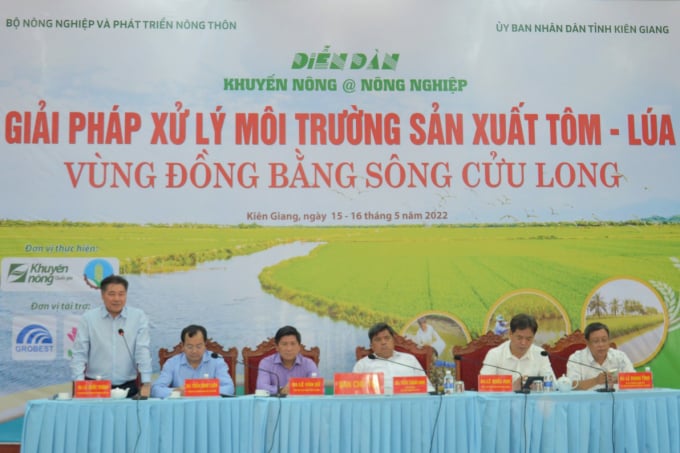
Deputy Minister of Agriculture and Rural Development Tran Thanh Nam (3rd from right) chairs a workshop on environmental treatment solutions in rice-shrimp production in the Mekong Delta held by the National Center for Agriculture and Rural Development and Kien Giang province with the participation of Bo De Seafood Group. Photo: Trung Chanh.
After the Covid-19 pandemic outbreaks in the southern provinces had great impacts on farmers in general and shrimp farmers in particular, Bo De Seafood Group has issued many policies to support and help recover production after the crisis.
Ms. Nguyen Thi Hang, General Director of Bo De Seafood Group shared solutions to build a team of professional farmers in the coming time.
After the crisis caused by the Covid-19 pandemic, what plans and policies has Bo De Seafood Corporation issued to help shrimp farmers recover production?
In the context of post-Covid-19, all sectors are facing difficulties. The global supply chain has been broken, the price of materials has increased, and even that of some good items has doubled.
However, to cope with that, Bo De has committed to implementing many practical solutions to support farmers including a pledge not to increase the material input price such as yeast, minerals, Mother Water biotechnology products, and other service products that we were providing.
In addition, the company continues to coordinate with the National Agricultural Extension Center (NAEC) to implement a public-private partnership (PPP) program to open training courses on transferring biotechnology applications and organizing a linkage chain for shrimp-rice production in the Mekong Delta provinces.
This program has helped create a value chain and the households participating in it can reduce input costs by up to 75%, contributing to reducing total costs and improving productivity and quality of agricultural products including rice, shrimp, crab, and fish, thereby helping farmers improve their income.
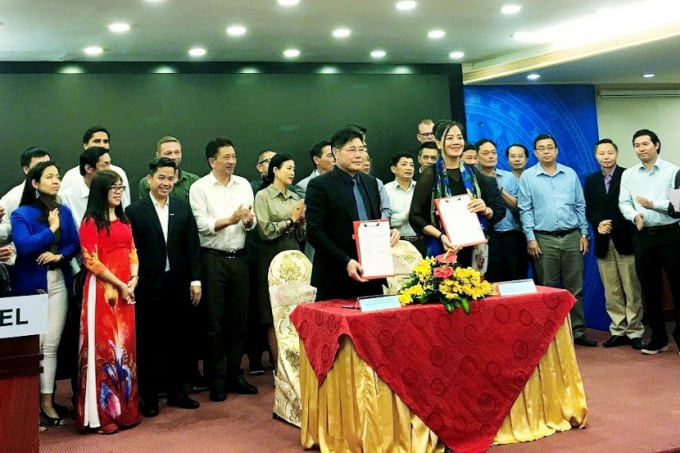
The National Agricultural Extension Center and Bo De Seafood Group have implemented a project to professionalize farmers from 2020 until now, helping many of them improve their skills in aquaculture. Photo: Tung Dinh.
What is the vision and aspiration of Bo De Seafood Group in the coming time, especially for the agricultural sector and farmers?
First of all, we want to thank Vietnam Agriculture Newspaper for always supporting and accompanying businesses and farmers during the past time.
In the current context, the aspiration and vision of our business are to well-perform the PPP contract with the NAEC; promote and expand the implementation scale of the project on "Professionalization for Farmers", with the strategic goal to build a "system of skilled farmers".
In addition to vocational training, we help farmers understand the essence of the market economy, which is also the relationship between goods and brands, and make them realize their role while participating in the market economy.
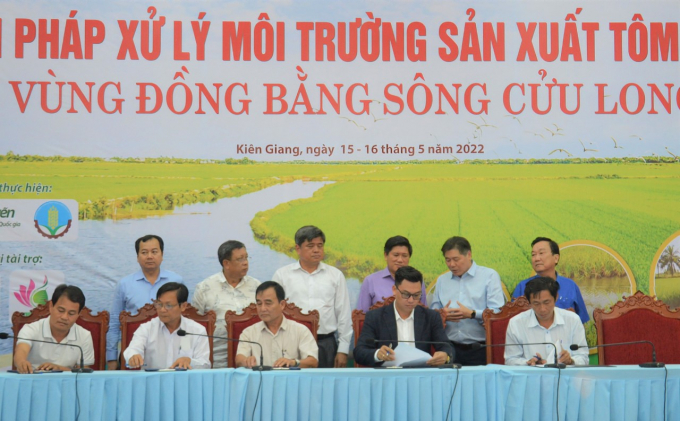
Deputy Minister of Agriculture and Rural Development Tran Thanh Nam (behind, 3rd from left) witnessed the signing of a joint program on organic rice-shrimp production to adapt to climate change and protect the environment in the Mekong Delta. Photo: Trung Chanh.
I think businesses operating in the agricultural sector need a strategy to support farmers in three areas. The first is training and transfer of advanced techniques and technologies. The second is to support them in building production linkages and creating value chains. Finally, businesses should help farmers innovate their thinking, and apply high technology and biotechnology to production to build a responsible production community associated with the protection of the environment and sustainable ecosystems
That is a solid foundation for farmers to gradually improve their capacity in producing large quantities of high-quality goods meeting the increasing requirements of markets such as Europe, the United States, and Japan.
So in your opinion, what is a "professional farmer"?
In my opinion and also the goal of Bo De Group, professional farmers must be those who possess high knowledge of proficient skills and have a professional attitude in production. They are the ones who know how to locate resources, set specific goals, organize production according to principles and know how to manage risks.
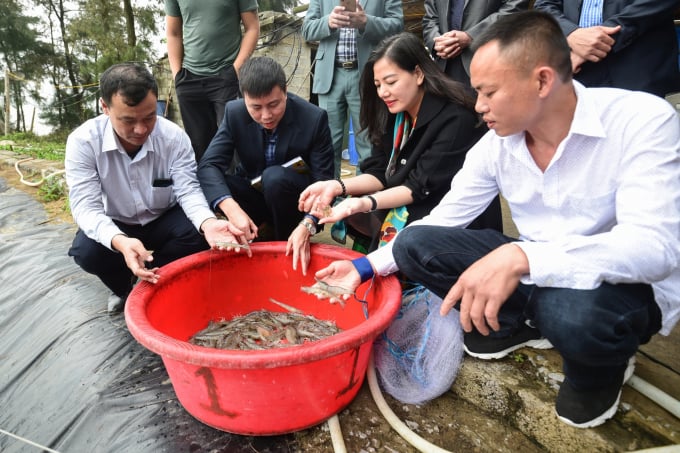
Ms. Nguyen Thi Hang, General Director of Bo De Seafood Group (2nd from right) visits some households raising off-season white-leg shrimp using Mother Water products of Bo De Fisheries in Hoang Truong, Hoang Hoa district, Thanh Hoa province. Photo: Tung Dinh.
Moreover, professional farmers must always comply with legal policies, participate in production, behave with high community responsibility and know how to link production goals with environmental protection of the and sustainable ecosystems.
From the perspective of a pioneer enterprise implementing the project "Professionalization of Farmers", what do you suggest for the "commander" of the agricultural sector?
First of all, as an enterprise in the agricultural sector, I am always interested in forums chaired by Minister of Agriculture and Rural Development, Le Minh Hoan. At important forums, the Minister had pointed out the bottlenecks and made strategic decisions for the foundation of agriculture.
It can be seen that Minister Hoan always gives priority to the quality and professional level of the production force, places farmers at the center and regards them as a driving force of development.
Therefore, I boldly recommend the Minister to study the planning for vocational training and granting vocational certificates to farmers in production and supply chain for export.
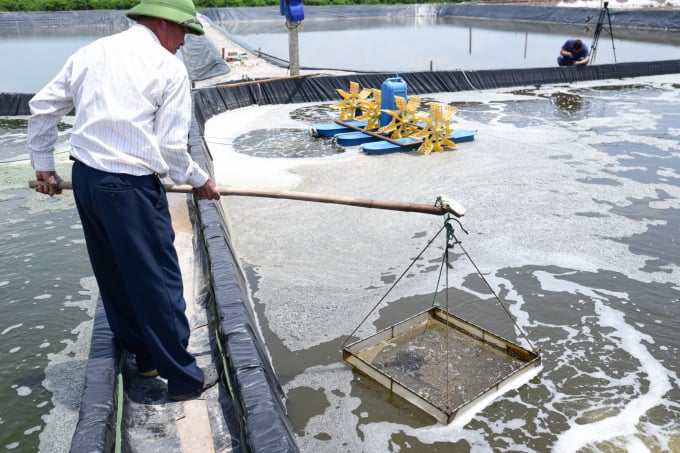
Bo De Group has started to support shrimp farmers in the North to apply biotechnology to production. Photo: TD.
The policy on granting vocational certificates to professional farmers will ensure their mission in the new era-the period of deep integration into the world economy and the industrial revolution 4.0.
Mother Water products of Bo De Group are applied by farmers and cooperatives to the extensive farming model and high-tech shrimp farming. They are evaluated as suitable for environmental conditions in the shrimp-rice area, helping stabilize the environmental conditions in shrimp farming, especially those of the alkalinity and pH, thereby improving shrimp health and reducing loss.
Thank you!
Translated by Linh Nguyen

(VAN) VAAS and numerous Vietnamese enterprises have signed cooperation agreements with Japanese partners to promote agricultural technology and trade connectivity.
/2025/05/29/5625-12-214801_567.jpg)
(VAN) Provincial mergers in the Mekong Delta promise to streamline administration, expand inter-provincial raw material areas, and foster close linkages in agricultural value chains, benefiting both businesses and cooperatives.

(VAN) Merging Mekong Delta provinces contributes to the expansion of agricultural raw material areas, addressing previous constraints caused by provincial boundaries. Additionally, this expansion will reduce costs and strengthen linkages between businesses, cooperatives, and farmers.
/2025/05/29/1043-2-153730_145.jpg)
(VAN) The Government's policy to merge provincial-level administrative units opens up major opportunities for the Mekong Delta region to reshape its agricultural development strategy toward large-scale production, effective regional linkages, and sustainability.

(VAN) The mutual export of agrifood products between the European Union (EU) and the United Kingdom (UK) must occur again without certification, border controls or other red tape. This was agreed at the UK-EU summit.
/2025/05/22/5121-2-173645_677.jpg)
(VAN) NBSAP Tracker identifies strengths and areas for improvement in the National Biodiversity Strategy, based on each region’s priorities and capacities.

(VAN) The draft amendment to the Circular on rice export trading stipulates a periodic reporting regime for rice exporting enterprises.